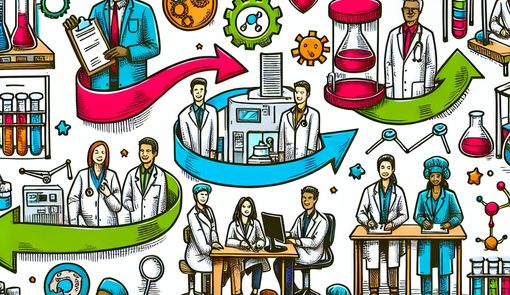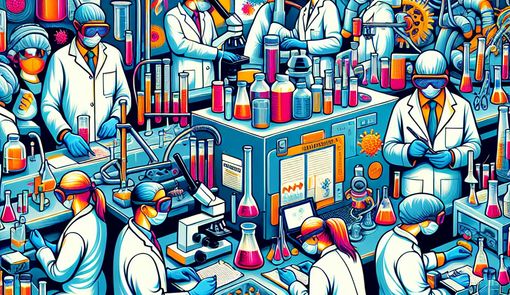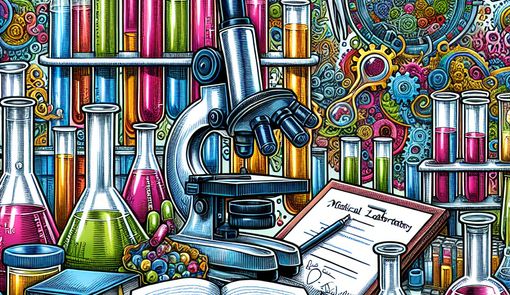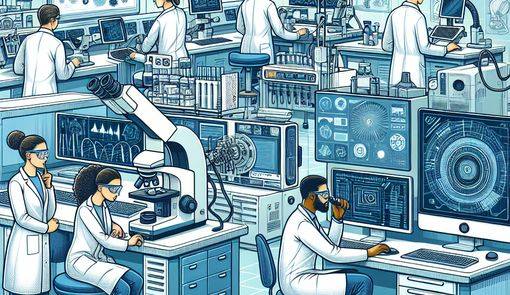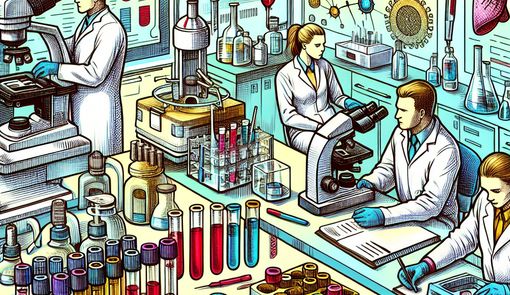Navigating the Job Market: A Guide for Aspiring Medical Laboratory Technicians
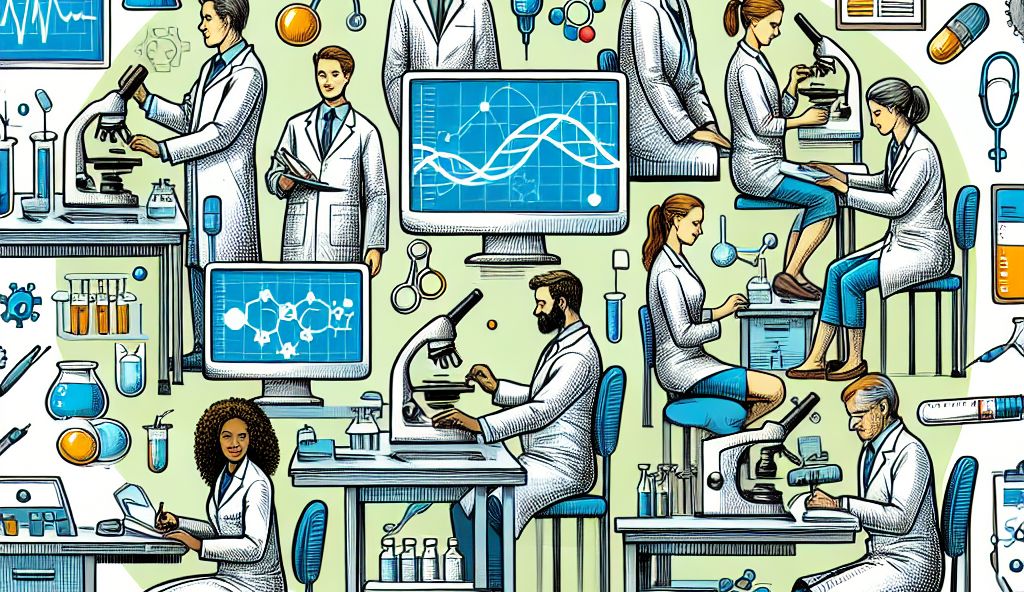
The path to becoming a Medical Laboratory Technician (MLT) is marked by the pursuit of precision, dedication to health sciences, and the meticulous study of detailed laboratory procedures. Yet, even as one masters the skills necessary for this critical healthcare role, navigating the job market poses its own set of challenges. For both new and seasoned MLTs, understanding how to effectively search for and secure the right employment opportunities is crucial for professional success. This comprehensive guide offers a roadmap for aspiring Medical Laboratory Technicians to find their place in the workforce and uncover job opportunities that align with their career goals.
Education and Certification
Before leaping into the job market, it's essential to ensure that you have the right educational foundation and certifications demanded by employers. Most MLT positions require at least an Associate's degree in Medical Laboratory Technology or a closely related field. Accredited programs provide the necessary clinical and theoretical knowledge that serves as the bedrock for a successful career.
Once your formal education is complete, obtaining certification is the next step. Most employers look for candidates who are certified by recognized organizations like the American Society for Clinical Pathology (ASCP) or the American Medical Technologists (AMT). These certifications do not just add credibility to your resume; they are often mandatory for practice in many states. Taking the time to pass these certification exams can open up a broader range of job opportunities and potentially lead to higher pay scales.
Building a Strong Resume and Cover Letter
Your resume is your first introduction to potential employers. It should highlight your education, certifications, technical skills, and any relevant clinical experience you've accumulated. Whether through internships, clinical rotations, or work placements, any hands-on experience is incredibly valuable and should be prominently featured.
Your cover letter is another critical tool in your job application arsenal. It provides a space to introduce yourself and explain why you are the ideal candidate for the job. Tailoring your cover letter to each application and referencing specific job requirements shows employers that you are meticulous and genuinely interested in the position.
Networking and Professional Development
Joining professional organizations such as the ASCP and networking through conferences, workshops, and online forums can significantly expand your professional circle. This can lead to direct job leads, new insights into advancements in laboratory technology, and potential mentorship opportunities.
Professional development courses and continuing education also keep you up-to-date with the latest industry developments and can enhance your employment prospects. Becoming a specialist in areas like molecular diagnostics or immunohematology, for example, can set you apart from other candidates and align you with niche positions that require specific expertise.
Utilizing Job Search Tools and Strategies
The digital age has vastly simplified the process of finding job openings. Online job boards, company career pages, and professional networking sites like LinkedIn are all valuable resources that can be leveraged. Setting up job alerts for Medical Laboratory Technician positions can ensure that you never miss an opportunity.
However, do not underestimate the power of more traditional methods. Attending career fairs, contacting hospital and clinical laboratories directly, and even reading the classifieds in professional journals can yield fruitful results. Employing a mix of online and offline strategies is the most comprehensive approach.
Preparing for the Interview
Once you have landed an interview, preparation is key. Familiarize yourself with common lab procedures and equipment as well as the specific institution's focus areas. Expect scenario-based questions that test your knowledge and problem-solving abilities under pressure.
Demonstrate your interpersonal skills by practicing responses to questions regarding teamwork, conflict resolution, and patient interaction. As a Medical Laboratory Technician, you may not always work directly with patients, but your role is integral to the overall healthcare team and patient outcomes.
Starting Your Career
When you do secure a position, focus on gaining a wide breadth of experience. Early in your career, being open to different opportunities—even if they don't seem like a perfect fit—can be invaluable for building skills and your professional network. As you gather experience, take the time to reflect regularly on your career progress and set new professional goals.
The journey of a Medical Laboratory Technician is a balance between scientific expertise and continuous learning. It is a dynamic field that offers a high level of job satisfaction, knowing that your work plays a vital role in healthcare. By staying diligent in your job search, honing your skills, and maintaining a willingness to adapt, you can navigate the job market successfully and launch a rewarding career as a Medical Laboratory Technician.
Seek out mentors and colleagues who can offer guidance, take advantage of job counseling if available, and always be open to receiving constructive feedback. The employment landscape for Medical Laboratory Technicians is rich with possibility, and with the right approach, you're well on your way to finding the right job and making a meaningful impact in the field of medicine.
Remember, the job market can be competitive, but for those armed with the right tools and strategies—and a passion for the health sciences—a fulfilling career as a Medical Laboratory Technician is well within reach. It's a journey that blends the pursuit of scientific knowledge with the gratification of patient care, and it starts with a firm step into the job market armed with knowledge, strategy, and confidence.
Frequently Asked Questions
1. What are the typical job responsibilities of a Medical Laboratory Technician (MLT)?
Medical Laboratory Technicians perform a wide range of duties essential to the proper functioning of a medical laboratory. This includes conducting diagnostic tests on various bodily fluids, analyzing the chemical content of samples, operating laboratory equipment, maintaining accurate records of test results, and ensuring quality control procedures are followed.
2. How long does it take to become a certified MLT?
The length of time to become a certified Medical Laboratory Technician can vary depending on the individual's educational path. Typically, completing an Associate's degree program in Medical Laboratory Technology takes around two years. Following graduation, obtaining certification through organizations like the ASCP or AMT involves passing an exam, which can require additional preparation time.
3. What are the advantages of obtaining certification as an MLT?
Certification as a Medical Laboratory Technician offers numerous benefits. It validates your skills and knowledge in the field, making you more competitive in the job market. Certified MLTs often have access to a wider range of job opportunities, enjoy higher earning potential, and may be preferred by employers seeking qualified professionals who meet industry standards.
4. How important is networking for MLTs?
Networking is crucial for Medical Laboratory Technicians looking to advance their careers or secure new job opportunities. Building professional connections can lead to mentorship opportunities, job referrals, and insights into industry trends. By participating in networking events, MLTs can expand their professional circle and stay informed about developments in the field.
5. What should be included in a strong MLT resume?
A strong resume for a Medical Laboratory Technician should showcase relevant education, certifications, technical skills, and any hands-on experience in laboratory settings. Including details about specialized training, proficiency in laboratory equipment usage, and accomplishments related to patient care or quality assurance can make your resume stand out to potential employers.
6. How can MLTs best prepare for job interviews?
To prepare for job interviews, Medical Laboratory Technicians should research the prospective employer, review common laboratory procedures, and practice answering both technical and behavioral questions. Demonstrating knowledge of the medical laboratory field, showcasing problem-solving abilities, and highlighting communication skills are key for a successful interview experience.
7. What are some continuing education opportunities for MLTs?
Continuing education plays a vital role in the professional development of Medical Laboratory Technicians. Options for ongoing learning include attending workshops, pursuing specialized certifications in areas like molecular diagnostics or hematology, and engaging in online courses to stay current with advancements in laboratory technology.
8. How can MLTs stay updated on industry trends?
MLTs can stay informed about industry trends by engaging in professional development activities, joining relevant organizations, reading industry publications, and attending conferences and seminars. Keeping abreast of advancements in medical laboratory practices and technologies is essential for maintaining a competitive edge in the field.
Further Resources
For further reading and resources to enhance your understanding and prospects as a Medical Laboratory Technician, consider exploring the following:
- American Society for Clinical Pathology (ASCP) - The ASCP website offers a wealth of information on certifications, continuing education, job opportunities, and professional networking in the field of clinical pathology. Visit ASCP for more details.
- American Medical Technologists (AMT) - Explore the certification options and resources provided by AMT to further validate your credentials and advance your career as a Medical Laboratory Technician. Access their website here.
- LinkedIn - Utilize LinkedIn not only for networking but also for job search purposes. Join relevant groups, follow industry influencers, and stay updated on the latest trends in medical laboratory technology. Visit LinkedIn to get started.
- Clinical Laboratory Management Association (CLMA) - The CLMA offers valuable resources for leadership development, industry news, and best practices in laboratory management. Check out their website at CLMA for more information.
- LabCE - LabCE provides online continuing education courses for laboratory professionals, including Medical Laboratory Technicians. Enhance your knowledge and skills by enrolling in courses tailored to your professional growth. Explore LabCE here.
- Medical Laboratory Observer - Stay informed about the latest industry trends, technology advancements, and job opportunities by reading the Medical Laboratory Observer publication. Access their website here.
- Reddit - Medical Lab Professionals - Engage with a community of medical laboratory professionals on Reddit to share experiences, seek advice, and stay connected with peers in the field. Join the discussion at Medical Lab Professionals Subreddit.
- Indeed - Explore job openings specifically for Medical Laboratory Technicians on the Indeed job board. Set up alerts, compare salaries, and discover new career opportunities in the healthcare industry. Visit Indeed to start your job search journey.
These resources offer a diverse range of information, networking opportunities, job listings, and educational tools to support your career growth and success as a Medical Laboratory Technician. Dive into these resources to expand your knowledge, connect with professionals, and take proactive steps towards advancing your career in the dynamic field of laboratory medicine.

